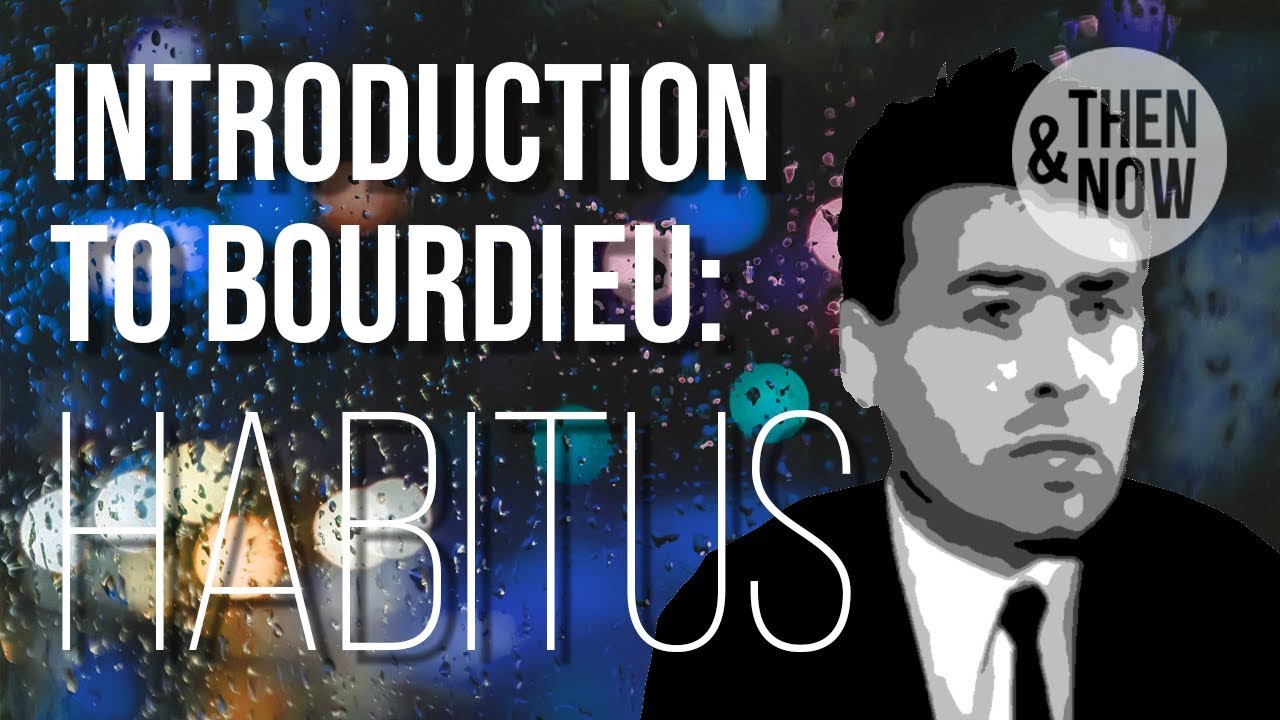Then & Now
In this introduction to Pierre Bourdieu, I look at a number of his key concepts: Habitus, Field & Cultural Capital, while focusing primarily on habitus. First I contextualize Bourdieu’s sociology in the debates between structuralism, existentialism, and postmodernism. I look at how Bourdieu can help us understand emotions, class and children’s health inequalities.
Then & Now is FAN-FUNDED! Support me on Patreon and pledge as little as $1 per video: http://patreon.com/user?u=3517018
Or send me a one-off tip of any amount and help me make more videos:
https://www.paypal.com/cgi-bin/webscr?cmd=_s-xclick&hosted_button_id=JJ76W4CZ2A8J2
Buy on Amazon through this link to support the channel:
Follow me on:
Facebook: http://fb.me/thethenandnow
Instagram: https://www.instagram.com/thethenandnow/
Twitter: https://twitter.com/lewlewwaller
Sources:
Ed by. Michael Grenfell, Pierre Bourdieu: Key Concepts
Richard Jenkins, Pierre Bourdieu
Pierre Bourdieu, Outline of a Theory of Practice
SCHEER, MONIQUE. “ARE EMOTIONS A KIND OF PRACTICE (AND IS THAT WHAT MAKES THEM HAVE A HISTORY)? A BOURDIEUIAN APPROACH TO UNDERSTANDING EMOTION.” History and Theory 51, no. 2 (2012): 193-220. http://www.jstor.org/stable/23277639.
Gareth Wiltshire, Jessica Lee & Oli Williams (2019) Understanding the reproduction of health inequalities: physical activity, social class and Bourdieu’s habitus, Sport, Education and Society, 24:3,
226-240, DOI: 10.1080/13573322.2017.1367657
Nick Corssley, Habit and Habitus, http://journals.sagepub.com/doi/pdf/10.1177/1357034X12472543
https://partiallyexaminedlife.com/2016/04/11/ep37-1-bourdieu/
Credits:
Claud Levi-Strauss Image – https://upload.wikimedia.org/wikipedia/commons/b/b8/Levi-strauss_260.jpg
UNESCO/Michel Ravassard [CC BY 3.0 (https://creativecommons.org/licenses/by/3.0)]
Sartre image – https://upload.wikimedia.org/wikipedia/commons/e/e9/Jean_Paul_Sartre_1965.jpg
See page for author [CC BY-SA 3.0 nl (https://creativecommons.org/licenses/by-sa/3.0/nl/deed.en)]
Source




Ok, so you're a product of your environment. What a revelation! Social studies = unmitigated bullshit.
So to my understanding, it can be simplified as the internalisation, understanding and subconscious adherence to social norms and patterns
Thanks!
What clock? Why and for what?
Good video. As a language nerd I have to point out that the plural of “habitus” is “habitus”
This is a very good overview of habitus. Nice one. Thanks for uploading. 👍
this made no sense
Metaphysics not chained to science is here to stay — and exploratory and innovative metaphysics, even if not based on foundationalism — is valuable in its own right. Practice/empiricism/pragmatism require an equal balance of theory or metaphysics or whatever you want to call it — novel ideas! One theme I see with postmodernism is the unchaining of metaphysics and theory (more broadly) from scientific naturalism and the Western university system. Novel ways of looking at things, even if not easily rectified within our current (or past) cultural norms, should still be valued in themselves as novel ideas! But the ego doesn't like this because it wants to find the one right Logos and stick with that as the 'one right' answer or objective truth behind the scenes. That's what I think we're getting tired of and starting to see through in the Postmodern Turn.
2:00 – Context
9:35 – Difference between habitus & habit ?
40 people wanted to be unconstrained by society. Freedom they theorized, was in hitting the dislike button.
Aaaw, i miss social studies….
Doesn’t it all come down to survival?
This helped a lot…thank you
It took more than 200 years to travel from David Hume’s “ Man is a habitual animal “ to Bourdieu’s “Man is a habitus animal “!!! Such a small distance??!!
It could have taken much longer had we not had Karl Marx(Historical-dialectical materialism) in between!!. We are, after all, not as rational as we think we are!!
Watching this instead of doing my readings because I procrastinated too long. Awesome video, thank you!
I came across, what I think, is the best definition of the habitus :
– embodied history, internalized as a second nature and so forgotten as history – is the active presence of the whole past of which it is the product.
This gets to the heart of the excessive egotistical claims of the existentialists as well as the enormous guilt it produces in people that fail to recognise the role of the “invisible hand” played by the habitus!!!
Bourdieu was a charlatan, sell old wine in the new bottles with his obscure, cloudy, shifting and shifty vocab of basic concepts in the field of culture, class and the structure-agency debate so as to climb and defend his position on the academic hierarchy. To this day, 30 years later, there is no consensus on how to operationalize cultural and social capital clearly. On structure-agency, Bourdieu's take is pedestrian, offering nothing more than Giddens (also a fraud) or Archer (better than Giddens, but also not a significant contributor to the field). Bourdieu is far less important than other French structuralists and posties. At least Barthes and Derrida gave us insightful and often original readings of different texts and elements of culture, Foucault a better understanding of how power constitutes us via discourse, D&G are fun, especially on microdot. But Bourdieu is an intellectual grifter.
Don't dare pretend Bourdieu adds anything to how we describe and explain the culture of class in the UK. Far better work, both in theory and empirical research has been done for decades covering everything from specific forms of speech pattern, to the minutia of consumption norms, work habits, etc. For a better theoretical take on structure-agency as abstract theory check out Roy Bhaskar. For the empirical work, just do a lit review, esp on the UK (it is silly to give Bourdieu credit for saying anything new or insightful about class in the UK – the whole field has "been there, done that, for decades). More broadly, defining different kinds of skill, or norms, or culture as a form of"capital" is a counter-productive reversion back to the grab bag approach of Locke and Smith (who at least had the excuse of doing this stuff early on, as first movers, when the system was much younger). Social capital also isn't capital, just connection to wider groups (could be community, club, church etc.) that was studied with more clarity before Boudieu muddied the waters. Then symbolic capital, also not a capital and also it is Holden Caulfield style hyperbolic nonsense to call symbolic derogation a form of violence (as Bourdieu does). And all of this is actually less accurate social science, done whilst telling the Marxists they are narrow dogmatists, in the service of nothing more than Bourdieu's own position in the field.
Nice introduction and understood alot🤩🤩🥰🥰🥰🥰🥰🥰
Long live bourgeois subjectivity
your voice is so good for these videos lmao
You have to admire the optimism and rationalism of the French. Of course, this is mostly nonsense. People rarely think, or make choices. We live with practical consciousness: if, for example, I run for the bus stop, catch a bus, arrive at my destination, I'm not thinking about my options; I'm doing things by rote. I know what my expectations of a shopkeeper, or a family or a policeman is: my use of archetypes establishes my approach and expectations. It's rare, indeed, that I'm called upon to think self-reflexively about my actions. The functions of the structures and institutions I'm in also guide me: whatever the natural propensities I was born with, my predelictions, all this will be steered empirically (as Bhakar notes, the world is layered between the actual, real and empirical). I've yet to encounter this free human that Bourdieu refers to
Hello! A random question, may I ask what's the accent you are speaking? I like very much this sound of spoken English! ♥ (is it, for example, southern accent or?) :D!
Bullshit. With the exception of Foucault, the “truths” of postmodern philosophy that are actually just self contained language games, or are trivial and already known by everyone.
can i just point out social class is not actually define by bourdieu? or does he? does he define working middle ect or just speak about capital?
Great! So precise and clear
If this channel truly would not exist without me, it has no legitimacy to exist. Get a job
great info, but i find myself trying to determine the connections between the content and the royalty-free images being shown and it's a bit distracting. so i listened without the video. very informative!
The video is great but your pronunciation of Bourdieu is killing me 😂
By far the best introductory discussion of his work that I've come across! You really manage to highlight the most important stuff, well done.
Very cool
I only were here because my teacher told me to
Helpful for my final!
A great video, and your links have proven invaluable for my thesis. Many thanks!